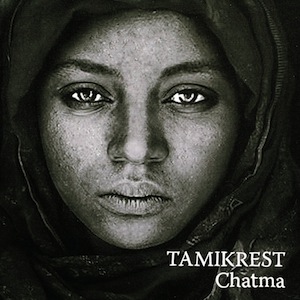Due to the conflict in Mali, Tamikrest are currently living in exile in neighbouring Algeria and their third album serves as a dispatch to update the outside world of the current plight of the Tuareg people. In the two years since their last album large parts of Mali, including their home town of Kidal in the north, have been invaded by extreme Islamist militia brutally imposing Sharia law, and on Chatma Tamikrest don’t hold back in telling their side of what is happening.
The title translates into the Kel Tamashek for "sisters" and the album is dedicated to the Tuareg women, who have lived through poverty, malnutrition, illness and losing their loved ones as a consequence of recent events, while ensuring "both their children’s survival and the morals of their father and brothers." While their lyrics have always been deep, their moral indignation at the hardships faced by the Tuareg people on Chatma is marked by a world weary heaviness as the group describe the turbulent times they are living in. Their distinct blend of hypnotic African blues provides a glimpse into another world with profound concerns about the fate of their people, nomadically shifting across the desert in search of an elusive peace.
Opening track ‘Tisnant An Chatma (The Suffering Of My Sisters)’ introduces the album’s theme of honouring the Tuareg women, with the group’s familiar desert groove built on sandy electric guitar riffs and dubby bass, as frontman Ousmane Ag Mossa sings, "Others have been beaten in their bodies, We can no longer accept this fact… The sisters are waiting for their freedom," while playing duelling guitars with Paul Salvagnac that dazzle with piercing atmospheric swirls. ‘Imanin Bas Zihoun (Nothing Will Make My Soul Joyful)’ explores another of the album’s recurring topics, with a faster, catchier hook, as Mossa laments, "My soul is no longer joyful, My heart is carried away by thoughts." The wild ululating cries of former Tinariwen member Wonou Walet Sidati can be viewed as a rallying call as Mossa’s sorrow is clear, "My way of being pleases me no more, Most of my time is motionless." The pair repeat each other’s lines on ‘Itous (The Objective)’ as they reflect on the human cost of what is happening around them, "The desert is not for sale, It shelters the tombs of our ancestors, And men pay the price of freedom with their lives."
Meditative acoustic track ‘Ahaka Achail Aynaian Dgahchilan (Tomorrow, Another Day)’ reflects on what the uncertain future might bring before ‘Djanegh Etoumast (I Say To The People)’ follows more urgently with blazing guitars, catching the group at their most dynamic, with a surprising funky bass breakdown as Chieck Tiglia takes a rare step outside of his usual solid groove.
The album takes a more far-out twist with the experimental ‘Assikal (The Journey)’ that employs psychedelic backwards production techniques with Ry Cooder-like guitars giving the feeling of getting lost in the desert as Mossa describes the "three stages" of life in the Sahara. The fuzzed out guitars and rapid-fire militaristic percussion by djembe player Aghaly Ag Mohamedine and drummer Ibrahim Ag Ahmed Salim on ‘Takma (Pain)’ mix with spacey synth sounds to capture all of the ingredients that helps make Tamkirest’s music so special. The relentless desert rock trance offers a hopeful message during hard times, "Freedom is my soul’s ultimate goal. In my land, the desert, where my sisters live."
A spiritual journey into the darkest corners of what life can present, Chatma is an album played by a group with a lot at stake and there is no room for complacency. In the closing track ‘Titmar (Memories)’ Mossa sings from the heart, "I remember our words, I didn’t leave anything out, I said it all." The group’s skills have been learned by playing hour after hour in desert tents, or late at night under starlight by campfire, electric guitars powered by generators, and the recordings capture these exotic textures. Despite everything that is going on their lives Tamikrest never resort to anger – theirs is a message of peace and hope.


